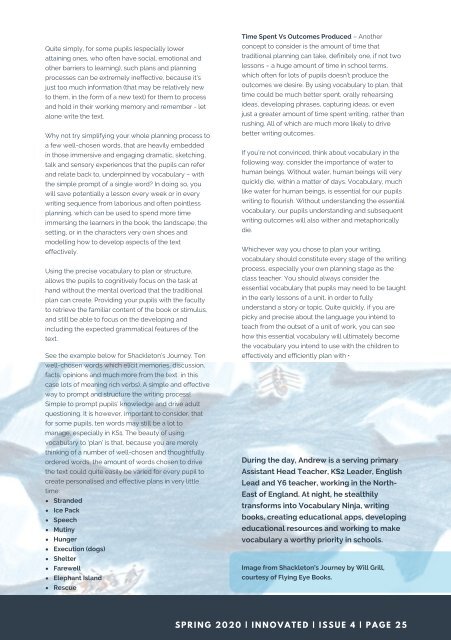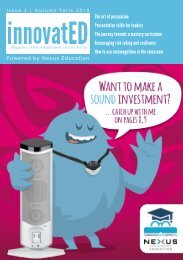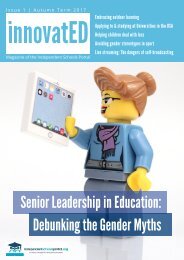innovatED Magazine - Issue 4 - Spring 2020
A mixture of news, opinion, research, ideas, great practice and regulatory updates. innovatED takes a global perspective and brings the latest educational developments from across the world onto your laptop, smartphone - and with the printed edition - into your staff room.
A mixture of news, opinion, research, ideas, great practice and regulatory updates. innovatED takes a global perspective and brings the latest educational developments from across the world onto your laptop, smartphone - and with the printed edition - into your staff room.
Create successful ePaper yourself
Turn your PDF publications into a flip-book with our unique Google optimized e-Paper software.
Quite simply, for some pupils (especially lower<br />
attaining ones, who often have social, emotional and<br />
other barriers to learning), such plans and planning<br />
processes can be extremely ineffective, because it’s<br />
just too much information (that may be relatively new<br />
to them, in the form of a new text) for them to process<br />
and hold in their working memory and remember - let<br />
alone write the text.<br />
Why not try simplifying your whole planning process to<br />
a few well-chosen words, that are heavily embedded<br />
in those immersive and engaging dramatic, sketching,<br />
talk and sensory experiences that the pupils can refer<br />
and relate back to, underpinned by vocabulary – with<br />
the simple prompt of a single word? In doing so, you<br />
will save potentially a lesson every week or in every<br />
writing sequence from laborious and often pointless<br />
planning, which can be used to spend more time<br />
immersing the learners in the book, the landscape, the<br />
setting, or in the characters very own shoes and<br />
modelling how to develop aspects of the text<br />
effectively.<br />
Using the precise vocabulary to plan or structure,<br />
allows the pupils to cognitively focus on the task at<br />
hand without the mental overload that the traditional<br />
plan can create. Providing your pupils with the faculty<br />
to retrieve the familiar content of the book or stimulus,<br />
and still be able to focus on the developing and<br />
including the expected grammatical features of the<br />
text.<br />
See the example below for Shackleton’s Journey. Ten<br />
well-chosen words which elicit memories, discussion,<br />
facts, opinions and much more from the text in this<br />
case lots of meaning rich verbs). A simple and effective<br />
way to prompt and structure the writing process!<br />
Simple to prompt pupils’ knowledge and drive adult<br />
questioning. It is however, important to consider, that<br />
for some pupils, ten words may still be a lot to<br />
manage, especially in KS1. The beauty of using<br />
vocabulary to ‘plan’ is that, because you are merely<br />
thinking of a number of well-chosen and thoughtfully<br />
ordered words, the amount of words chosen to drive<br />
the text could quite easily be varied for every pupil to<br />
create personalised and effective plans in very little<br />
time:<br />
Stranded<br />
Ice Pack<br />
Speech<br />
Mutiny<br />
Hunger<br />
Execution (dogs)<br />
Shelter<br />
Farewell<br />
Elephant Island<br />
Rescue<br />
Time Spent Vs Outcomes Produced – Another<br />
concept to consider is the amount of time that<br />
traditional planning can take, definitely one, if not two<br />
lessons – a huge amount of time in school terms,<br />
which often for lots of pupils doesn’t produce the<br />
outcomes we desire. By using vocabulary to plan, that<br />
time could be much better spent, orally rehearsing<br />
ideas, developing phrases, capturing ideas, or even<br />
just a greater amount of time spent writing, rather than<br />
rushing. All of which are much more likely to drive<br />
better writing outcomes.<br />
If you’re not convinced, think about vocabulary in the<br />
following way; consider the importance of water to<br />
human beings. Without water, human beings will very<br />
quickly die, within a matter of days. Vocabulary, much<br />
like water for human beings, is essential for our pupils<br />
writing to flourish. Without understanding the essential<br />
vocabulary, our pupils understanding and subsequent<br />
writing outcomes will also wither and metaphorically<br />
die.<br />
Whichever way you chose to plan your writing,<br />
vocabulary should constitute every stage of the writing<br />
process, especially your own planning stage as the<br />
class teacher. You should always consider the<br />
essential vocabulary that pupils may need to be taught<br />
in the early lessons of a unit, in order to fully<br />
understand a story or topic. Quite quickly, if you are<br />
picky and precise about the language you intend to<br />
teach from the outset of a unit of work, you can see<br />
how this essential vocabulary will ultimately become<br />
the vocabulary you intend to use with the children to<br />
effectively and efficiently plan with •<br />
During the day, Andrew is a serving primary<br />
Assistant Head Teacher, KS2 Leader, English<br />
Lead and Y6 teacher, working in the North-<br />
East of England. At night, he stealthily<br />
transforms into Vocabulary Ninja, writing<br />
books, creating educational apps, developing<br />
educational resources and working to make<br />
vocabulary a worthy priority in schools.<br />
Image from Shackleton’s Journey by Will Grill,<br />
courtesy of Flying Eye Books.<br />
S P R I N G 2 0 2 0 | I N N O V A T E D | I S S U E 4 | P A G E 2 5






